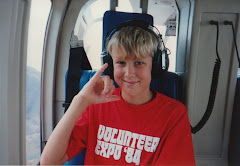She laughed and said, "You need to put that in your blog." And then she said something very profound, but first let me articulate why flying still gets to me.
 My current instructor, Grant, mentioned that when he was a kid, he used to climb trees so high his grandmother would implore him to come down, but he would climb even higher because he loved the heights so much. Future helicopter pilot, that one.
My current instructor, Grant, mentioned that when he was a kid, he used to climb trees so high his grandmother would implore him to come down, but he would climb even higher because he loved the heights so much. Future helicopter pilot, that one.When I was a kid, I would climb to the second branch, look down, and wonder what the hell had possessed me to risk my life.
Sometimes in the helicopter I still look down through a thousand feet of air and feel my insides seize, but for the most part I can handle the heights, which I suppose is progress. However, that irrational fear has been replaced with a rational one.
That is to say, I no longer fear being sucked from of my seatbelt and out the door through some impossible inversion of the laws of physics, but I am more aware of the real danger in flying helicopters.
Helicopter engines fail. I've personally spoken with pilots who have experienced serious engine trouble in mid-flight. I've seen videos of crashes in which pilots with similar trouble failed to perform autorotation, and died as a result. I've also witnessed firsthand the complexity of performing autorotation.
 Every time I watch an instructor fly in autorotation, I'm astounded by their ability to multitask so many things so quickly. I can't even list them all for you, because I don't even know them. But at the very least, the pilot must simultaneously:
Every time I watch an instructor fly in autorotation, I'm astounded by their ability to multitask so many things so quickly. I can't even list them all for you, because I don't even know them. But at the very least, the pilot must simultaneously:- monitor rotor RPM on the tachometer gauge
- monitor airspeed on the airspeed gauge
- monitor descent rate on the vertical speed indicator
- identify a nearby landing spot, and then maintain nearly constant visual contact with it (while still watching all the above)
- monitor his own sense of weight (or weightlessness) in his seat
- make constant, precise adjustments to manual controls to keep RPM, airspeed, and descent rate in extremely narrow ranges
- make the required compensatory adjustments to the other manual controls in order to balance any of the above adjustments
- steer to the landing spot
I'm not sure how I'm ever going to pull that off. What if my engine fails and I just freeze? What if I'm just practicing engine failure and I freeze?
Plus, although I trust my instructor to successfully manage autorotations, I also know that sometimes instructors don't. It says so right there in the title of Robinson's supplemental safety notice SN-38 for their helicopter, which was issued in direct response to a disturbing trend:

So hell yeah I'm scared. And the more I think about it, the more I realize this fear is only one of several reasons why learning to fly helicopters is the exact wrong thing for me to be doing right now. But I'm still doing it, and I'll explain why (and finish the story about my Mom) in another post.




No comments:
Post a Comment